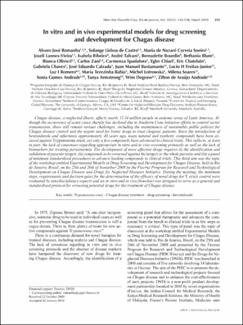In vitro and in vivo experimental models for drug screening and development for Chagas disease
Fecha
2010-03-02Autor
Romanha, Alvaro José
Lisboa de Castro, Solange
Correia Soeiro, Maria de Nazaré
Lannes-Vieira, Joseli
Ribeiro, Isabela
Talvani, André
Bourdin, Bernadette
Blum, Bethania
Olivieri, Bianca
Zani, Carlos
Spadafora, Carmenza
Chiari, Egler
Chatelain, Eric
Chaves, Gabriela
Calzada, José Eduardo
Bustamante, Juan Manuel
Freitas-Junior, Lucio H
Romero, Luz I
Terezinha Bahi, Maria
Lotrowska, Michel
Soares, Milena
Gumes Andrade, Sonia
Armstrong, Tanya
Degrave, Wim
De Araújo Andrade, Zilton
Metadatos
Mostrar el registro completo del ítemResumen
Chagas disease, a neglected illness, affects nearly 12-14 million people in endemic areas of Latin America. Although the occurrence of acute cases sharply has declined due to Southern Cone Initiative efforts to control vector transmission, there still remain serious challenges, including the maintenance of sustainable public policies for Chagas disease control and the urgent need for better drugs to treat chagasic patients. Since the introduction of benznidazole and nifurtimox approximately 40 years ago, many natural and synthetic compounds have been assayed against Trypanosoma cruzi, yet only a few compounds have advanced to clinical trials. This reflects, at least in part, the lack of consensus regarding appropriate in vitro and in vivo screening protocols as well as the lack of biomarkers for treating parasitaemia. The development of more effective drugs requires (i) the identification and validation of parasite targets, (ii) compounds to be screened against the targets or the whole parasite and (iii) a panel of minimum standardised procedures to advance leading compounds to clinical trials. This third aim was the topic of the workshop entitled Experimental Models in Drug Screening and Development for Chagas Disease, held in Rio de Janeiro, Brazil, on the 25th and 26th of November 2008 by the Fiocruz Program for Research and Technological Development on Chagas Disease and Drugs for Neglected Diseases Initiative. During the meeting, the minimum steps, requirements and decision gates for the determination of the efficacy of novel drugs for T. cruzi control were evaluated by interdisciplinary experts and an in vitro and in vivo flowchart was designed to serve as a general and standardised protocol for screening potential drugs for the treatment of Chagas disease.

